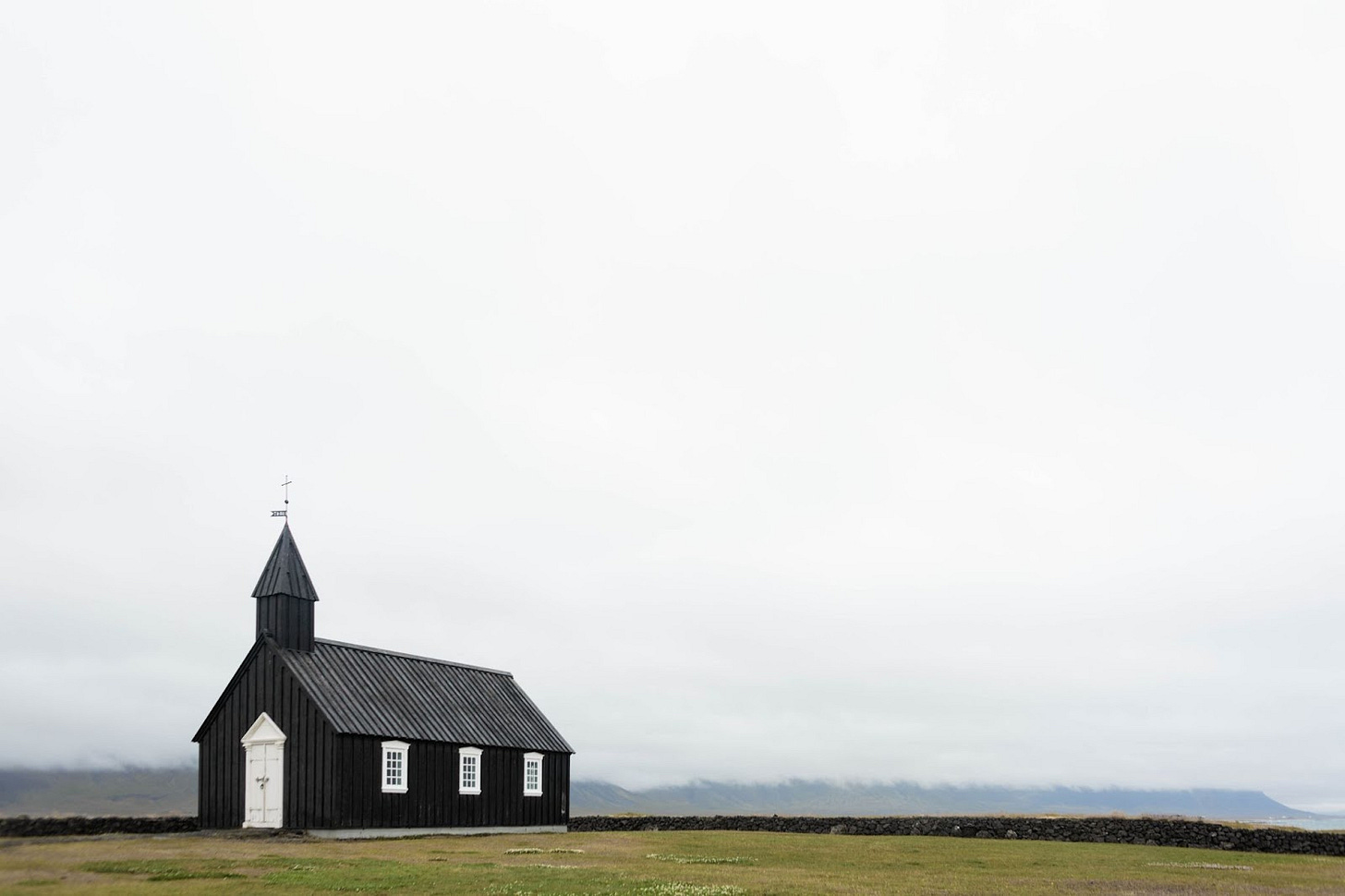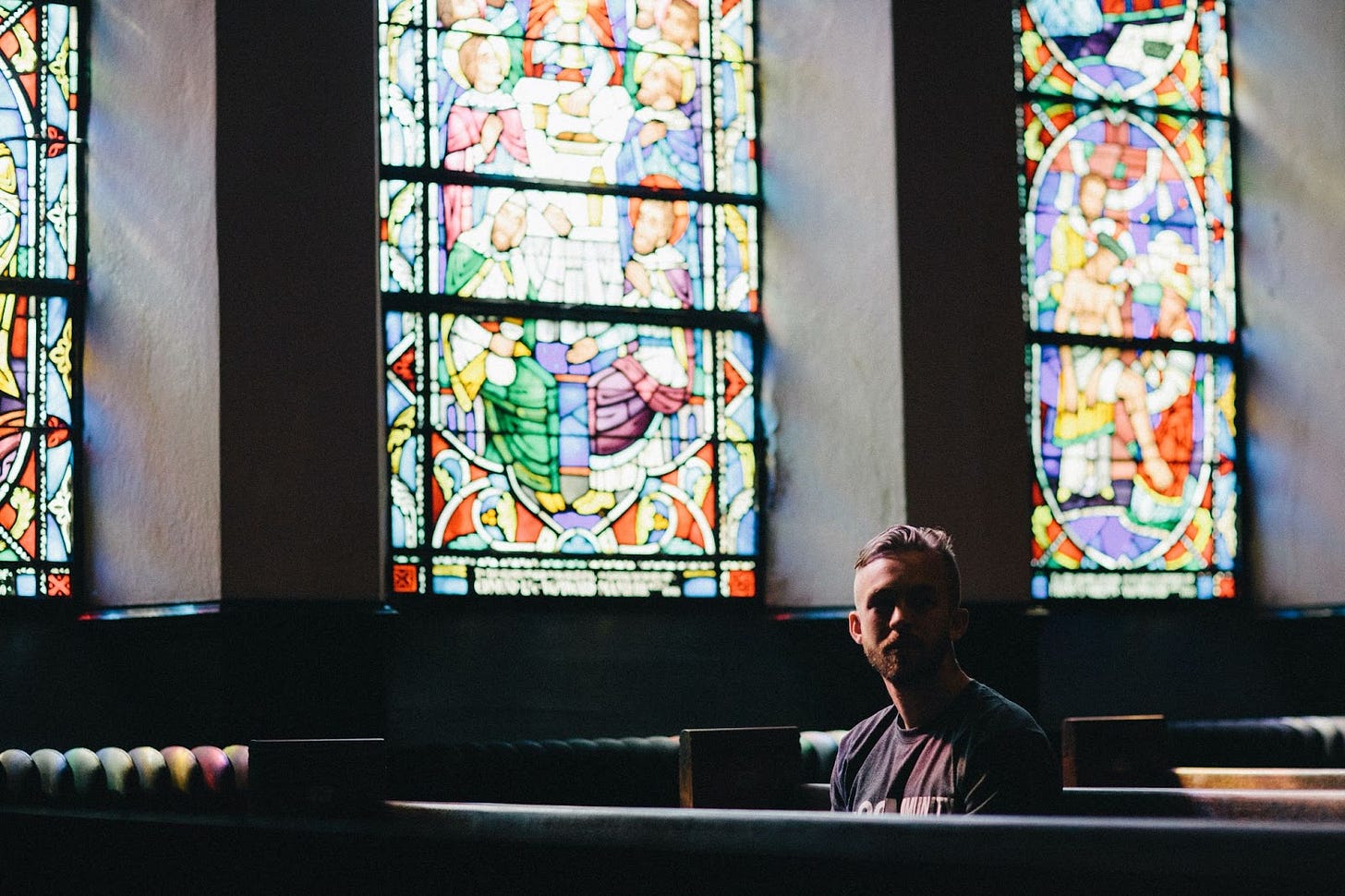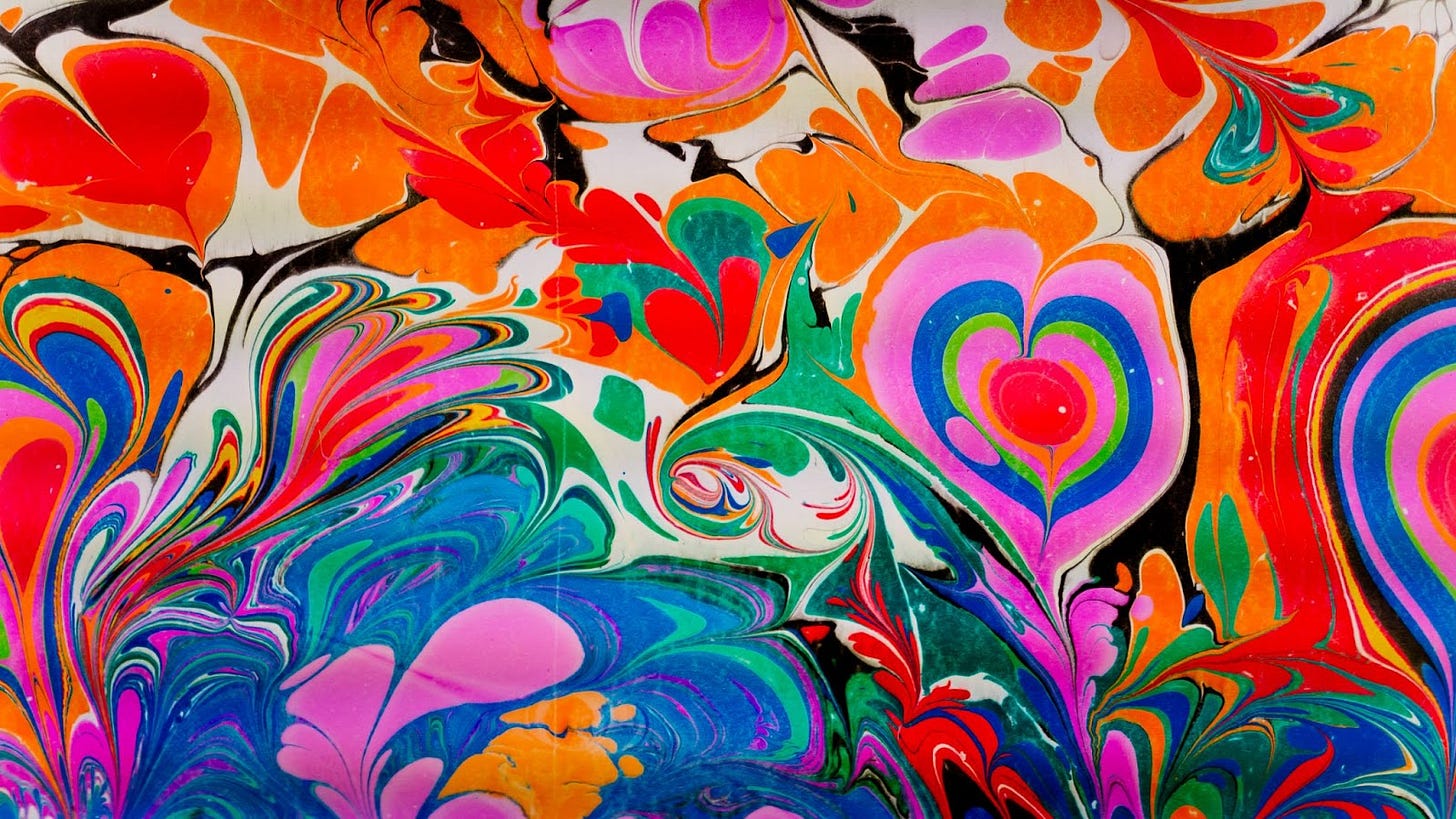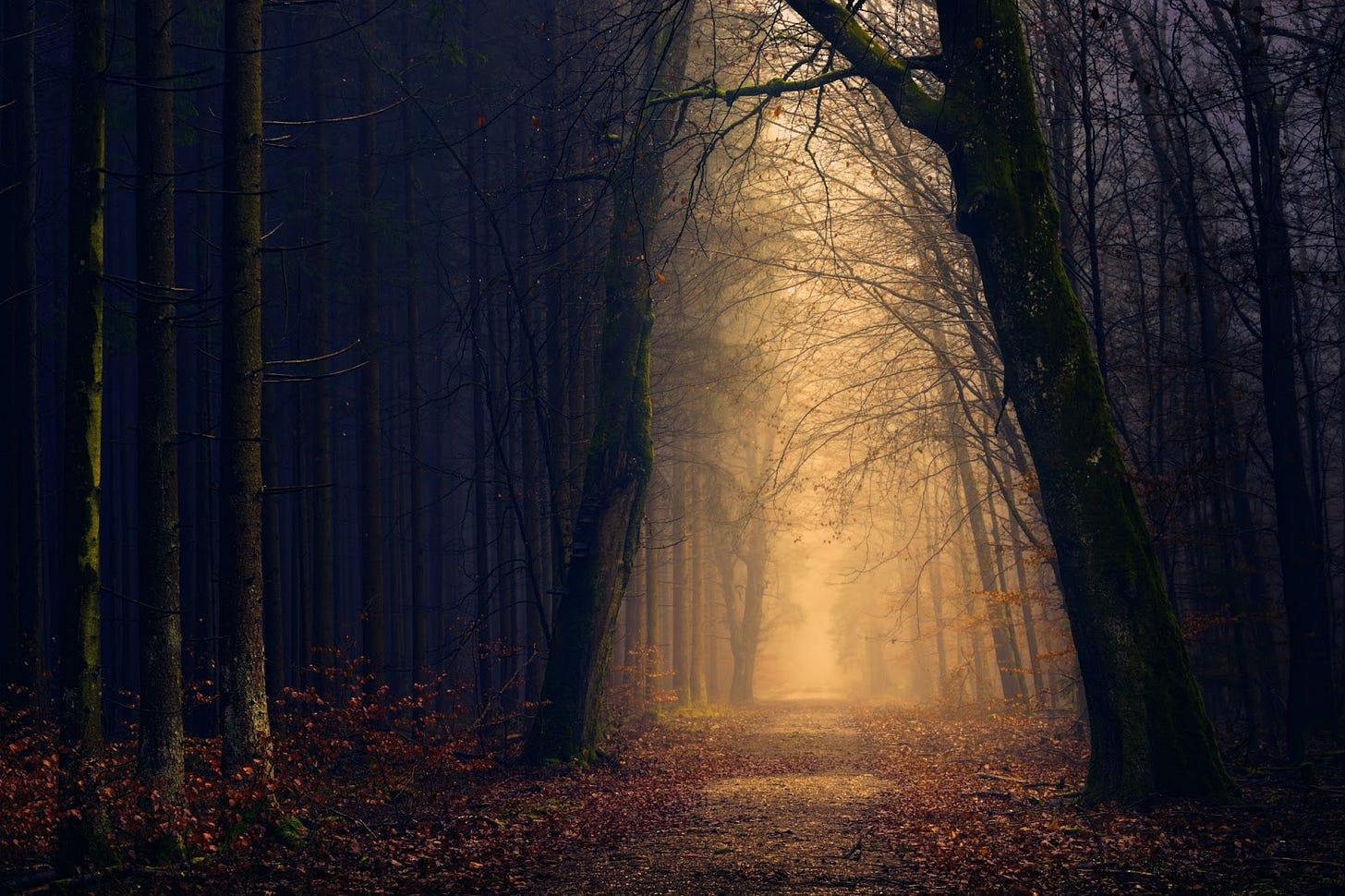Reader Series pt. 4: A Christian View on Psychedelics
A reader offers a radically different perspective grounded in the Christian tradition.
I am pleased to publish the following long-form, multi-faceted essay by Christian writer Phil Cotnoir.
A few weeks ago, I came across Phil’s brilliant piece “Joe Rogan and the Search for Transcendence” which alluded to my reflection on taking a psilocybin microdose with my Christian friend.
I profoundly disagreed with some of Phil’s core arguments, but appreciated his great thoughtfulness, rigor, and spiritual-cultural insights. I reached out offering to publish an original essay by him going deeper into psychedelics from a Christian perspective.
My core disagreement with Phil’s biblically-oriented worldview is the foremost reason why I am publishing this piece. As I have begun to learn in the past few weeks of quasi-solitude and inward exploration, I don’t know anything (in the purest, most fundamental sense).
My prior beliefs and views are the product of my environment and the wiring of my mind that prompts me to certain philosophies and paths over others (more on this very soon).
I have so much to learn from others — shutting myself off from differing views at the young age of 21 is a grave injustice to my mind, heart, and soul.
Enjoy.
By: Phil Cotnoir
I want to thank Rav Arora for his invitation to contribute to his Substack. I have really enjoyed Rav’s writing as well as the guest posts. What I offer in this piece is a response to his overall project from the perspective of a practising Christian observing the cultural trends taking shape around us. It takes an unusual generosity to share one’s platform with someone who disagrees with you, even among friendly Canadians.
Introduction
There is an old story of a man who left his home in search of an island paradise he felt sure existed; the last undiscovered place on earth. He sailed oceans and traversed continents before finally coming upon the shores of an entirely unknown place fitting the exact description in his mind. With the greatest anticipation, he walked inland only to discover that it was in fact the far side of his homeland from whence he had departed all those months ago. But far from being disappointed, he realized he had been living in the best place on earth, only he had not known it. This is a story of disenchantment and re-enchantment, and as I intend to show in this essay, it is a parable for spiritual quests in our post-Christian age.
The catalyst for this piece was an invitation by Rav Arora to engage with the idea that Christians might have reason to use psychedelics for therapeutic or medical reasons. His friend Paul, who like me grew up in the church, got to the point where he was willing to try a psilocybin microdose, as recounted here. Psychedelics are big right now, and there is a heady excitement about the possibilities of combining their use with existing modes of psychotherapy and counselling to improve mental health care. The early studies are extremely promising. Might these be better treatments than the current drugs on offer from pharmaceuticals? Sure. Would I celebrate a reduction in human suffering from PTSD, depression, and other ailments? Absolutely.
But when it comes to a Christian using these substances, there are a number of issues that stand in the way. And given the spiritual convictions of the Christian worldview, ultimately we cannot fully celebrate anything that leaves a person alienated from their Creator. This leaves me feeling like a bit of a party pooper in this space, where Rav and surely most of his readers are excited about the possibilities of psychedelics. Nevertheless, I am fascinated by this movement and how it intersects with my Christian convictions. So I hope you’ll read this with an open mind as I explore these themes.
If I could sit down with Rav’s friend Paul, I would want to gently ask him some questions. Growing up in the church can be very difficult. The expectations and social pressures towards a certain kind of performed piety are very real. For myself, these kinds of pressures led to a disconnect between my church self and my real self, and plunged me into a secret addiction to pornography for most of my teenage years. It took a violent car accident to get me to ask serious questions about the state of my soul. Before returning to Paul’s predicament, I’d like to set the stage by exploring the ideas of enchantment and the darkness we each find within ourselves.
Enchantment
First popularized by Max Weber in the early 20th century, disenchantment refers to the way that life in a secularized and increasingly industrialized world has fundamentally changed our inner mental landscape and experience of the world. Many insightful thinkers since then have played on this theme to help make sense of where we are today. Severed from the transcendent above and uprooted from what is below, we are afloat in the abstract cloud of modern existence.
The result of this is a profound spiritual malaise. And you don’t need to be a Christian or a theist to acknowledge this. The irreligious might say that we’ve evolved in every culture to have some sacred reference point that gives a transcendent meaning to our lives, as well as a connection to place and culture. As a Christian I would say we were designed for vertical connection with the living God as well as a certain rootedness in place, community, and family. Human beings simply cannot flourish internally or externally without these orienting and grounding points of reference.
No one is immune to the way this shapes our modern lives. Like many today, I have been feeling a draw towards a slower pace of life, a quieter existence, and a deeper connection to the natural world. So my family and I moved out to the countryside in late 2020. My children now spend long hours exploring our humble little acre of land, allowing their fertile imaginations to run wild on epic quests. Together we are learning the sweat-earned pleasure of growing one’s own food, heating with wood, and tending a little piece of land. We might even get chickens this year. But despite being surrounded by stunning natural beauty, I often find myself with frayed nerves and an addled mind from being overly connected to social media and the news cycle. Disconnecting from those is good, but the root of our problems goes much deeper.
Darkness Within
Rav writes eloquently about the “tyranny of self.” This phrase captures nicely the spirit of the modern psyche. I say modern not because it was unknown in the past but because in recent years I have come to believe that this fevered state of mind is aggravated and amplified by our constant digital stimuli, our collective amputation from transcendence, and our always-connected internet lives. While we can certainly find examples of this feverish anxiety and self-focus in history and in the literature of ages past—Raskolnikov in Crime and Punishment, Macbeth in Shakespeare’s play, and even King David in a number of Psalms—there is no doubt that rates of anxiety and depression are at an all-time high in the West. What was rather rare and extraordinary has become the norm. People’s inner lives are a chaotic mess.
One of the things I so appreciate about the diagnosis in Rav’s Tyranny of Self piece is the honesty about the darkness inside each of us. This is rare because each one of us has a kind of moral coping mechanism where we reflexively deny our own dark impulses and desires. The Christian word for these things is sin, although people tend to prefer the more therapeutic language of brokenness. In his fascinating book, Original Sin, Alan Jacobs traces the idea of human sinfulness throughout the ages and into our own. Jacobs points out that in the modern era there has been a concerted effort to move past this idea of sin and to enshrine in its place a belief in the essential goodness of humanity. This seems nice at first, but it leaves one large and unanswered question: how do we account for the evil and brokenness that we see around us and in us? The quest to find a compelling explanation to that question is ongoing in our culture, with varying approaches vying for prominence. But the honest answer is that whatever essential goodness there is in mankind, it is marred and twisted. In Christian terms, we say that the image of God in us is tarnished and we are fallen such that every one of our faculties—mental, physical, and spiritual—is affected. This means we have a species-wide moral blindness when it comes to seeing ourselves and God rightly. When it comes to other people’s moral failings, however, we tend to see things far more clearly.
From this starting point of honesty about the darkness inside, we then look for solutions. And this is where the psychedelic resurgence seems to offer so much. The brochure, I will admit, is slick. Listening to Joe Rogan and his guests recount the benefits, and reading Noble Truths, I admit a part of me would love to experience such wondrous things! But one cannot explore the world of psychedelics very long before the topic of entities comes up. And that immediately opens the door to a discussion about whether these beings are real or not. And that quickly blends into bigger discussions about the mystery of human consciousness, UFOs, and the paranormal. It’s no wonder that podcasts dealing with any one of these topics almost always circle around to them all—even the ones ostensibly about theoretical physics. What these themes have in common is a challenge to the purely materialistic worldview that has long dominated the scientific establishment and Western culture.
But modern science did not disprove the existence of the supernatural. What it did was to exclude all evidence of it as inadmissible. In short, materialism was a metaphysical presupposition, not the result of unbiased inquiry. In the courtroom of the modern Western mind, testimony of the paranormal or non-material reality was thrown out of court like a confession obtained under duress. This was to some degree necessary for the scientific method to work, but what should have been a reticence for science to speak to the issue became a hubristic certainty that no such phenomena existed. This created the illusion of a world where mankind was confident, come of age, and fully in control of its environment. But as Jonathan Pageau has laid out in his Symbolic World videos and in discussions with Jordan Peterson, when we push the inexplicable and monstrous to the margins of our world, they have a habit of rushing back in.
Thus we find this incredible state of affairs: After roughly 400 years of progressively disenchanting the dark woods and night sky of all their faeries, jinns, elves, and spirits—a secularizing time during which belief in such things was ridiculed by ‘serious’ people and polite company—we now find the Pentagon admitting there are things in our skies that behave in ways we cannot explain by any known physical phenomenon, and serious national defense and aerospace contractors investigating with bewilderment a whole array of phenomena that sound like something from a Halloween night TV lineup. Leaving room for the inevitable cons, crazies, and charlatans, there is something of substance here. And once a person opens up to the possibility that there are beings beyond our easy grasp and comprehension, which seems increasingly difficult to deny, then a whole host of questions and possibilities present themselves, and certain choices must be made.
We’ll return to these themes shortly, but first I want to share a bit of Amanda’s story. I met her through a friend of mine as I was learning more about this fascinating topic.
Amanda’s Story
I spoke to Amanda about her experience with psychedelics. She had found herself in a difficult season in the aftermath of a broken marriage. She was now a single mother of two kids with no stability or full-time work. She fell into a deep depression. Her younger sister was into psychedelics and considered herself an “advocate for the responsible use of psychedelics.” Amanda saw The Spirit Molecule on Netflix and saw one of Joe Rogan’s podcasts on the topic. “I thought it could heal my mind,” she says. Although she had had an experience with Jesus in the past, she saw no reason why she couldn’t try psychedelics and "ask Jesus and his angels" to be with her.
She was in so much pain at this time with her depression and an eating disorder that she had come to believe this was the only way out of suffering. Her initial experience with DMT was under the guidance of her sister. She describes it as “insane,” wherein a green being full of feminine energy came upon her and became her spirit guide, giving her direction in her journey with psychedelia. A measure of euphoria and happiness did come about as a result—it seemed to work. Buoyed by the promising results, she went “all in” for some years, trying various different kinds of psychedelics in various settings.
Upon trying Ayahuasca, the intensity of the experiences seemed to cause a fracturing in her mind, with recurring vivid dreams of her daughter’s death torturing her. These were troubling signs, but she was drawn back to the ceremonies by the intensity and power of the beauty and the closeness she felt to the spiritual realm. “It was so intoxicating to me," she explained, "it seemed to give answers, meaning, and purpose.”
But the closeness to the spiritual realm led her to detach from real life and real relationships as she continually sought to have more and better spiritual experiences. After some years of this, it became clear the psychedelics were proving to be something of a dead end. She continued to have wonderful experiences at the ceremonies, but the bliss ended quickly after and the darkness always returned.
After a chance encounter in the grocery store with a high school classmate who expressed concern about her spiritual state, Amanda found herself wondering once more about Jesus. Scriptures long buried in her memory came back to her. She came upon the testimony of a former new age teacher named Steven Bancarz, as well as a wide-ranging conversation between him and the popular YouTuber and psychedelic enthusiast Your Mate Tom. This all culminated within a few days in a powerful experience where Amanda surrendered her life to Christ.
Psychedelics from a Christian Perspective
At a basic level my concern with psychedelics, as with any other service or product that promises so much, is that the reality cannot live up to the hype. There is simply no easy chemical cure for our problems. After the trips and the talks are over, human beings are still human beings, and certain inescapable facets of our nature will rear their ugly heads. I was glad to see Mohit Bassi’s well-balanced piece recently on this Substack and specifically his thorough treatment of the “underbelly of the emerging psychedelic space." I too fear that many suffering people will be swept along by the excitement and find themselves worse off than before. Especially now that big money is at stake.
For Christians, the critical distinction is between the use of substances for spiritual connection on the one hand and for purely medical reasons on the other. The first is strictly out of bounds for those who take the Bible as authoritative, while the second—assuming that psychedelics at certain dosages and in certain environments can be rightly considered as purely medical—would be a matter of conscience, discernment, and prudence. The Greek word pharmakeia refers to the use of drugs for spiritual purposes, including psychedelics, and it is found in the New Testament in a list of sins.
The Bible teaches us that our universe is quite populated with spiritual beings of various kinds. Many are in submission and obedience to God and some are not. They can interact with our minds and can even take physical shape at times. And yet we humans are not pure spirits. Nor are we like the animals, who are merely physical. We are the hybrids and the amphibians of creation: fully physical and fully spiritual, or embodied spirits. In God’s wisdom, this is our place in the created order. In this view, to deny either aspect of our nature is an act of rebellion, whether we deny the spirit and pretend to be nothing but animals or deny the physical and follow the gnostic temptation to focus entirely on the spiritual. The miracle of the incarnation, which we celebrate at Christmas, is the ultimate marriage of the material with the spiritual, the permanent divine stamp of approval on this thing we call humanity, for in it God himself became human.
As for drugs like MDMA, which do not induce a completely altered state of consciousness, the argument against their recreational use by Christians is similar to that against drunkenness. We are called to be sober, and sober-minded, in full control of our faculties. The idea of using a drug to gain wisdom or insight is foreign to both the Bible and historic Christianity, although that doesn’t stop some in more progressive wings of Christianity, which do not see the Bible as authoritative, from embracing their use. For a more thorough Biblical treatment of psychedelics and other drugs, see this article by Steven Bancarz, who I mentioned earlier. The question, again, is whether it can be demonstrated that these substances can be rightly considered purely medical in nature under certain circumstances. I have doubts about that, but it will be interesting to see how this all develops within the medical world, and how leading Christian thinkers respond to those developments.
As for the practice of microdosing, where a mind-altering trip is not the goal but rather some modulation of existing thought patterns, well that is more complex. Certainly it seems to bear closer resemblance to our modern antidepressants. And in terms of the spiritual dangers I outlined above, they don’t seem to apply in the same way, except perhaps in the simple fact that a successful microdose seems to invite the “hero dose” like an appetizer invites the main course. Rav’s friend Paul, who has grown up in the church and finds himself spiritually dry and romantically frustrated, is by no means unusual. I remember my early 20’s, filled with angst, in love with a girl who didn’t seem to know I existed, trying to figure out the world and my place in it.
I would urge Paul, and any Christian considering psychedelics, to instead consider the deep resources within the Christian church and tradition. For inner pain, we have robust movements of Biblical counselling; for a sense of rootlessness, we have ancient writings and wisdom spanning thousands of years; for transcendence, we have worship services, conferences, or better: a time of fasting and prayer and humbling oneself before the Lord. I find it interesting that of all the Christians I’ve spoken to who have taken psychedelics in the past, none of them would consider taking them now: they don’t need it anymore.
Two Ancient Sources of Wisdom
Rather than seeing it as a “silly religious bias” to forego psychedelics, perhaps it would be better to see two different sources of very ancient spiritual wisdom. One, the Judeo-Christian heritage, teaches us that there is danger in such things, and that practices such as the ingesting of psychoactive substances put us in contact with a world of spirits that is not our assigned place. And yet Christianity fully validates that longing for a connection to the spiritual. The Scriptures make clear that this God-given hunger for the transcendent is meant to be satisfied by God himself, through Christ his Son, as mediated by the Holy Spirit.
The other ancient source of spiritual wisdom comes from those traditions who have for millennia partaken of psychoactive substances to connect with the spirit world and transcend one's embodied consciousness. To some degree they can deliver on that promise. People can and do make contact with personal spiritual forces, and aside from the thrill of that experience, there is the added buzz that comes from knowing something that so much of society seems oblivious to. In addition, these practices make no personal moral demands. There are no ten commandments, no golden rule, no ultimate moral Judge. This makes it particularly compatible with the moral relativism of our age. Lastly, there is no creed or structure of authority like in a church. This resonates with our current cultural suspicion of authority and institutions.
One might say that Christians, with our view of fallen humanity, have a posture of self-doubt. Despite what Disney tells us, we know it is often folly to follow our hearts, since “The heart is more deceitful than anything else, and incurable—who can understand it?” (Jer. 17.9). Is it so unreasonable to trust that God knows better than we do? In fact, for millions of Christians, this is life-giving. We are simply called to walk faithfully in obedience to God’s revealed will, trusting that our heavenly Father works all things for our good.
It seems clear to me that in the coming years many millions of people will be trying psychedelics, and that this will almost certainly weaken the hold of strict materialism on our culture. And like any historical shift, there will be good and bad aspects to it. I’ve tried to make my concerns clear in this piece, but I also know that God uses all kinds of wrong turns to bring people to himself. For more along these lines, I recommend these thoughtful musings of the ever-eloquent Rod Dreher (who is an Eastern Orthodox Christian).
To return to the opening story of the man who went around the world, we in the West are now firmly post-Christian. As we cast about for a solution to the spiritual malaise afflicting us, the last place we will tend to look is the place we think we have just been: Christianity. Haven’t we just decided we’re done with those old superstitions? So a journey to the island paradise of paganism, earth religion, eastern philosophy, or psychedelics seems to be just the thing we need for our starved souls in our disenchanted world. But we perhaps forget (or have never learned) that the best of paganism was fulfilled and transcended by Christianity, as G.K. Chesterton chronicled in his book The Everlasting Man. For Amanda, and perhaps for Paul and many others now journeying through the twists and turns of psychedelia and new age spirituality, the way home spiritually may be to go round the whole world.
The Way Home
At one point in our conversation, Amanda said to me, “Christianity offers everything that we're looking for in the new age spiritual realm. But it requires submission and surrender and coming underneath the Word.” This submission and surrender is perhaps the sharpest diverging point between the two approaches to re-enchantment and the two sources of ancient wisdom we’ve been exploring. It is the hardest pill to swallow (no pun intended) for the tyrannical self we discussed earlier.
If there is one crowning feature of our fallen condition, it is this fierce autonomy. We desire to submit and surrender to God like a cat wants to take a bath. And I don’t think any weaving of words on my part can make it seem any sweeter to someone who has not tasted it. For it is certainly a radical kind of ego death, a dethroning of the self and an embracing of what seems like slavery (but ends up being freedom).
I asked Amanda to try and describe to me the difference between the psychedelic experiences and the experience she had when she was born again. The psychedelics, she said, were more “magical, seductive, mystical, captivating, and hypnotizing.” But with Jesus, she continued, “it’s way more powerful, and your soul knows the difference. Your soul trembles at the power of God. And the potency of Jesus Christ is so much greater than the manifestations” that came from psychedelics. Convinced of his raw authority over all other spirits, she surrendered to him and has been, by her own description, a new woman now for about two years.
It so happens that this is Easter weekend, the single most important event in the Christian calendar. The fact is that about two thousand years ago something happened in far-away Palestine that for some reason we are still talking about. If you’re willing to ingest psychoactive substances to jet your consciousness to other dimensions, or to try and heal the inner traumas we all carry within, let me suggest that you might try asking Jesus: "If you're real, reveal yourself to me." And then open a Bible to the gospel of John or go to a church that preaches the Bible and see what happens.
Phil Cotnoir is a husband, a father of four, an avid reader, and a freelance writer and editor. He studied theology and culture at Heritage College & Seminary and has served as an elder in his local church near Montreal. His day job is in the world of industrial automation and he blogs at www.philcotnoir.com.







The Golden Rule is not specific to Christianity.
CONFUCIANISM:
“Surely it is the maxim of loving-kindness: Do not unto others that you would not have them do unto you.”
— Analects, XV, 23
JUDAISM:
“What is hateful to you, do not to your fellow men. That is the entire law, all the rest is commentary.”
–The Talmud, Shabbat31a
BUDDHISM:
“Hurt not others in ways that your yourself would find hurtful.”
–Undana-varqa: 518
CHRISTIANITY:
“As ye would that men should do to you, do ye also to them likewise.”
–Luke 6:31
BAHA’I:
“It is our wish and desire that every one of you may become a source of all goodness unto men, and an example of uprightness to mankind. Beware lest you prefer yourself above your neighbors .”
–Baha’u’llah, Gleanings, 315
ZOROASTRIANISM:
“That nature only is good when it shall not do unto another whatever is not good of its own self.”
–Dadistan-I-Dinik, 94:5
HINDUISM:
“This is the sum of all true righteousness: deal with others as thou wouldst thyself be dealt by. Do nothing to thy neighbor which thou wouldst not have him do to thee after.”
–The Mahabharata
ISLAM:
“No one of you is a believer until he desires for his brother that which he desires of himself.”
–Sunnah
TAOISM:
“The good man ought to pity the malignant tendencies of others; to rejoice over their excellence; to help them in their straits; to regard their gains as if they were his own, and their losses in the same way.”
–The Thai-shang. 3
"we cannot fully celebrate anything that leaves a person alienated from their Creator"
This is stated as if it is a fact. There isn't any examples or reasons given to support the statement. In reality countless numbers of people have experienced the exact opposite.
And this: "But one cannot explore the world of psychedelics very long before the topic of entities comes up."
Again this is stated as fact. It isn't. I'm assuming that it is a reference to entities that some report during DMT experiences. Not all psychedelics are the same. DMT is a disociative psychedelic and is very different than psilocybin and other psychedelics. The statement quoted above would be similar to saying all colors are blue.
The story of Amanda also seems to paint all psychedelics as being the same or at least very similar ro DMT. They are not.
I very much agree with this: "There is simply no easy chemical cure for our problems." Psychedelics aren't a cure. Some can be tools but that requires preparation and should not be taken lightly. Many tools can be used in a positive or negative way. A hammer can help to build a house but it can also be used for vandalism.
As I read further I saw that you view the Bible as authoritative. I consider myself to be a Christian. I have studied most of the world's religions. The Bible was not handed to us by a hand coming out of the sky. It was written by inspired and some perhaps not so inspired people. What was accepted as being worthy of inclusion was decisions made by men. You may want to look into the gnostic gospels.
You lost me when comparing Christianity to other spirituality. A closer examination might actually enrich your understanding of Christianity. You say this: " these practices make no personal moral demands. There are no ten commandments, no golden rule, no ultimate moral Judge."
That is so off base. It is chauvinism. Remember "There are many mansions in my Father's house."